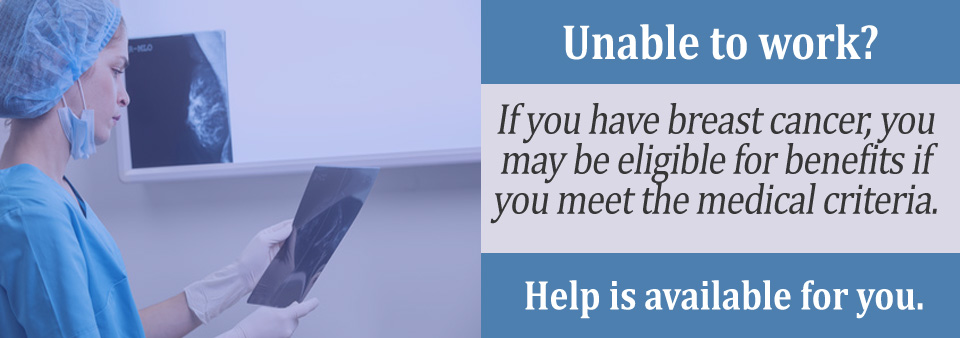If you have breast cancer that has left you unable to work, you may be eligible to receive disability benefits. These monthly benefits are administered by the Social Security Administration (SSA). Even when caught in its early stages when it is treatable, breast cancer can be debilitating.
The cancer treatments, which usually include radiation and chemotherapy, can be disabling. They cause nausea, fatigue, and an overall feeling of being unwell. If you cannot meet the medical criteria of the Blue Book listing, you may qualify by submitting a medical vocational allowance and a residual functional capacity (RFC) completed by a doctor.
How To Use an RFC If You Have Breast Cancer
The RFC is very detailed and will explain what you can and cannot do. It will clearly indicate your limitations and restrictions.
As an example, with breast cancer, you may be limited in your ability to lift, and you may not be able to reach above your head or frequently squat and bend. Because of your treatments, you may not be able to walk long distances, and you may become tired easily and have the inability to stand for long periods and you may require frequent rest breaks.
When the disability examiner reviews your RFC, he or she should be able to determine how your ability to perform routine tasks has been affected, as well as your ability to work. He or she should be able to determine if you can work, and if so, what kind of work you are able to do. The RFC is used as part of the medical vocational allowance, which takes your medical conditions, age, educational background, work history, and skills all into consideration.
As an example, you are 60 years old and you have worked in a clerical role since you graduated high school. Your job requires frequent arm use and movement of the top half of your body. After your breast cancer diagnosis and your surgery, your ability to move your arms without intense pain is very limited. Your memory and concentration have been affected by your medications and treatment, and you cannot stay focused or finished tasks.

What To Include With Your RFC For Breast Cancer
When you send in your RFC as completed by your physician, you should send in supporting medical documentation, such as surgical notes, scans and imaging results, lab work, and any other details about your diagnosis, prognosis, and treatment. Hard medical evidence and other supporting documentation are a necessity to the success of a disability claim.
Whether you are applying for Social Security Disability Insurance (SSDI) or Supplemental Security Income (SSI) play a role in the other documentation that you will need. SSDI will require a review of your last 10 years of work history to ensure you earned enough credits. SSI is needs-based and specific financial criteria must be met, so you will need to provide proof of income and assets.
Get Help With Your RFC For Breast Cancer
To improve your chances of a successful disability claim, you should enlist the help of a disability attorney. Disability lawyers take cases on a contingency basis. Complete the Free Case Evaluation Form on this page to share the details of your claim with a lawyer who represents clients in your state.